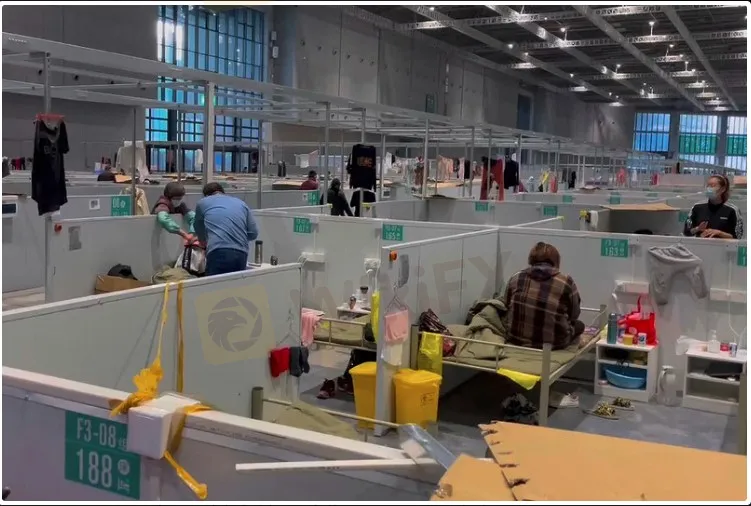简体中文
繁體中文
English
Pусский
日本語
ภาษาไทย
Tiếng Việt
Bahasa Indonesia
Español
हिन्दी
Filippiiniläinen
Français
Deutsch
Português
Türkçe
한국어
العربية
Shanghai quarantine: 24-hour lights, no hot showers
Abstract:National Exhibition and Convention Center which converted to a quarantine facility set up for people who tested positive but have few or no symptoms, in Shanghai, on April 15, 2022.
BEIJING (AP) -- Beibei sleeps beside thousands of strangers in rows of cots in a high-ceilinged exhibition center. The lights stay on all night, and the 30-year-old real estate saleswoman has yet to find a hot shower.
Beibei and her husband were ordered into the massive National Exhibition and Convention Center in Shanghai last Tuesday after spending 10 days isolated at home following a positive test. Their 2-year-old daughter, who was negative, went to her grandfather, while her nanny also went into quarantine.
Residents show “no obvious symptoms,” Beibei, who asked to be identified only by her given name, told The Associated Press in an interview by video phone.
“There are people coughing,” she said. “But I have no idea if they have laryngitis or omicron.”

The convention center, with 50,000 beds, is one of more than 100 quarantine facilities set up in China's most populous city for those such as Beibei who test positive but have few or no symptoms. It's part of official efforts to contain China's biggest coronavirus outbreak since the 2-year-old pandemic began. But it's also testing patience of people increasingly fed up with China's harsh “zero-COVID” policy that aims to isolate every case.
“At the beginning people were frightened and panicked,” Beibei said. “But with the publication of daily figures, people have started to accept that this particular virus is not that horrible.”
Beibei was told she was due to be released Monday after two negative tests while at the convention center.
Most of Shanghai shut down starting March 28 and its 25 million people were ordered to stay home. That led to complaints about food shortages and soaring economic losses.
Anyone who tests positive but shows few or no symptoms is required to spend one week in a quarantine facility. Beibei said she had a stuffy nose and briefly lost part of her senses of taste and smell, but those symptoms passed in a few days.
On Sunday, China reported 26,155 new cases, all but 3,529 of which had no symptoms. Shanghai accounted for 95% of the total, or 24,820, including 3,238 with no symptoms.
The city has reported more than 300,000 cases since late March. Shanghai began easing restrictions last week, though a health official warned the city didn't have its outbreak under control.
At the convention center, residents are checked twice a day for fever and told to record health information on mobile phones, according to Beibei. Most people pass the time by reading, square dancing, taking online classes or watching videos on mobile phones.
The 420,000-square-meter (4.6 million-square-foot) exhibition center is best known as the site of the world's biggest auto show. Other quarantine sites include temporary prefabricated buildings.
Residents of other facilities have complained about leaky roofs, inadequate food supplies and delays in treatment for medical problems.
“We haven't found a place with a hot shower,” Beibei said. “Lights are on all night, and it's hard to fall asleep.”
A video obtained by AP showed wet beds and floors due a leaky roof in a different facility in a prefabricated building.
“Bathrooms are not very clean,” Beibei said. “So many people use them, and volunteers or cleaners can't keep up.”
Disclaimer:
The views in this article only represent the author's personal views, and do not constitute investment advice on this platform. This platform does not guarantee the accuracy, completeness and timeliness of the information in the article, and will not be liable for any loss caused by the use of or reliance on the information in the article.
Read more

Forex Price Trend Prediction! | Come be a New Year Price Winner!
Become a New Year Price Winner by predicting the fluctuations of Forex!

Clearstream Opens Euro Channel to Connect Romanian Bond Market
Clearstream expands access to Romanian bonds, enhancing international investment opportunities through Euro-denominated instruments and streamlined settlement services.

The Yuan’s Struggle: How China Plans to Protect Its Economy
China introduced new measures on Monday to support its weakening currency, the yuan, amidst mounting economic and political pressures. The government announced plans to boost foreign exchange reserves in Hong Kong and ease borrowing restrictions for companies to improve capital flows.

Bursa Malaysia Dips as Investors Brace for 2025 Uncertainty
Bursa Malaysia saw a slight dip on the final trading day of the year as profit-taking and cautious sentiment dominated. The FBM KLCI declined 3.4 points to 1,634.28, with muted turnover of RM822.07 million due to year-end festivities. Blue-chip stocks, including Tenaga Nasional and Telekom Malaysia, experienced declines, while regional markets remained subdued amid global uncertainties. As 2024 approaches, investors remain cautious, balancing risks with potential opportunities.
WikiFX Broker
Latest News
How Long Can the Dollar Remain Strong?
Forex Price Trend Prediction! | Come be a New Year Price Winner!
HFM NY Special Offer!
How a Promised RM1.4 Million Return Turned into a Costly Scam
First Unfair Trading Case Reported Under South Korea’s Virtual Asset User Protection Act
Cinkciarz.pl Under Fire: Frozen Accounts, Missing Funds
“Predict and Win” Big Rewards! Join the Contest Now
South Korean President Yoon Suk Yeol's Arrest Shakes Markets
Titanium Capital LLC Ponzi Scheme: Henry Abdo Admits Fraud, Impacting Over 200 Investors
South Korea's Crypto Regulation Updates for 2025
Currency Calculator






